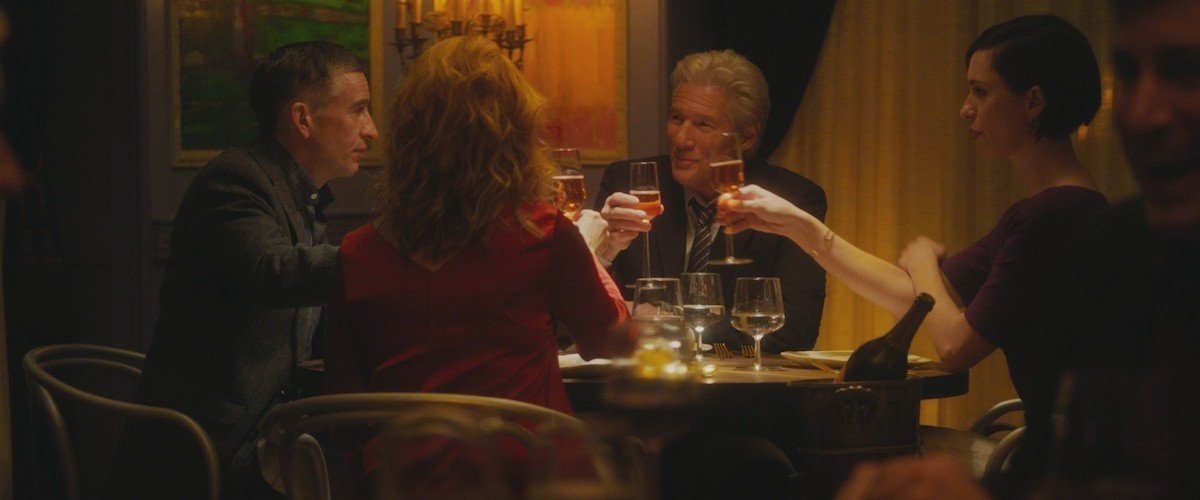Casino Film Review
The explosive beginning of Saul Bass's customarily brilliant opening credits sequence seems to bode well for Martin Scorsese's epic portrait of 1970s Las Vegas, Casino (1995). Weaving a tale about the town, as well as ill-fated mobsters 'Ace' Rothstein (based on actual Vegas-ite Frank 'Lefty' Rosenthal) and Nicky Santoro, the first hour merges documentary-style detail (including copious narration) with Scorsese's signature technical flair to depict how the Mob skimmed millions from the casinos. As Rothstein's success unravels, Scorsese unstintingly reveals the viciousness of the old school Vegas powerbrokers (including more gruesome violence than any previous Scorsese work), yet the virtuoso final montage and unsettling coda suggest that the new Disney-fied Vegas robbed the city of its success-fantasy soul. Notwithstanding the bravura visuals and attention to 1970s period detail, and despite a career-best performance from Sharon Stone as Rothstein's hustler-drug addict wife, most reviews noted that the reunion of director Scorsese with writer Nicholas Pileggi and stars Robert De Niro and Joe Pesci paled in comparison to 1990's Goodfellas. The De Niro-Pesci opposition was too familiar, as was the overlong story of Rothstein's rise and fall. Stone scored the film's sole Oscar nomination and won the Golden Globe for Best Actress.
Casino movie review & film summary (1995) Roger Ebert. Casino movie Casino เป็นภาพยนตร์อาชญากรรมมหากาพย์อเมริกันปี 1995 กำกับโดย Martin Scorsese ผลิตโดย Barbara De Fina และจัดจำหน่ายโดย Universal Pictures ภาพยนตร์เรื่อง. Casino (1995) movie Review and Film Summary The 1995 movie Casino, directed by Martin Scorsese, is extremely well received and praised by movie fans all over, even more than twenty years later. The story follows Sam “Ace” Rothstein (Robert De Niro) who runs a mob-owned casino called Tangiers. CASINO is a film by legendary director Martin Scorsese, who is famous for the movies Taxi Driver and Scarface. Scorsese has an enduring interest in the lives and workings of underworld figures and their lives, blown up to epic proportions, and Casino is no exception.

1995, R, 178 min. Directed by Martin Scorsese. Starring Robert De Niro, Sharon Stone, Joe Pesci, James Woods, Don Rickles, Alan King, Kevin Pollak, L.Q. Jones.
Casino Royale Film Review

- Sorry for being away so long guys! Hopefully this review makes up for it but I'm back in the swing of things and I'm already researching my next review.
- Read movie and film review for Casino (1995) - Martin Scorsese on AllMovie - The explosive beginning of Saul Bass's.
REVIEWED By Marjorie Baumgarten, Wed., Nov. 22, 1995
Film Casino Royale
That Martin Scorsese is one of the modern masters of cinema is a fact that is reiterated through each of his movies. He always struggles to find new strategies for seeing beneath the surface of things and for new approaches to the telling of stories. Casino, however, cannot be viewed as one of Scorsese’s masterpieces. Yet, while certainly less than successful, I’m reluctant to call it a failure. Because, then, I’d have to revoke my love relationship with the film’s spectacular opening sequence (let’s just say it begins with a magnificent bang). The term “failure” would also negate the novelty of certain shots and scenes, like the overhead shot of Las Vegas that presents the city as a mecca of light in an otherwise barren sea of darkness. Leave it to Scorsese to expose the Vegas gestalt in a new and original manner. Eye-opening material like this is peppered throughout the movie. Then, of course, it is always a pleasure to watch De Niro at work, especially when at work in a juicy role like that of Sam “Ace” Goldstein, the Mob’s consummate bookie chosen by the bosses to front their “legit” Vegas casino. Believing in De Niro as a Jew is a bit of a stretch, however he’s good enough that you don’t dwell on how you can take the goy out of Little Italy but …. Better than watching De Niro work alone is the pleasure of watching De Niro working a scene with Joe Pesci, who is cast as Nicky Santoro, the New York muscle brought in to smooth over the casino’s inevitable rough spots. And to answer the question on everyone’s lips – Can Sharon Stone cut it? – well, yes and no. She fares better than any of her previous work might have led you to expect, but no one will ever mistake her for an acting giant. The problems with her characterization can largely be laid at the feet of Scorsese, a filmmaker whose body of work has never evidenced much sensitivity toward his female characters. For every Alice Doesn’t Live Here Anymore and Boxcar Bertha there are dozens of Johnny Boys and Travis Bickles roaming the Mean Streets, dividing women up into the virtuous and the fallen. Stone’s top-of-the-heap casino hustler could be a fascinating character, but in Casino she is simply there to be the object of Scorsese’s affections and subsequent scorn. The story is about what it is like for Ace living with her and living without her; not the other way around. Scorsese depicts the boys’ clubs, whether the movie is The Last Temptation of Christ, The Last Waltz, The Color of Money, Cape Fear or GoodFellas. And speaking of GoodFellas, that movie may just be the source of many of Casino’s shortfalls. Casino reminds you in too many ways of the brilliance of GoodFellas, and in a way that dooms Casino to remain in its shadow. It more than just the resonant re-pairings of De Niro and Pesci and novelist/co-scriptwriter Nicholas Pileggi and Scorsese. Structurally, it tries to ape the climactic build-up of GoodFellas, but never quite blasts off as the climax of GoodFellas so viscerally does. Casino never really seems to have a point, and in a movie just a couple minutes shy of three hours, that really becomes a palpable problem. As a whole, the movie does not crap out at the table, but neither does it come up with a fistful of dollars.